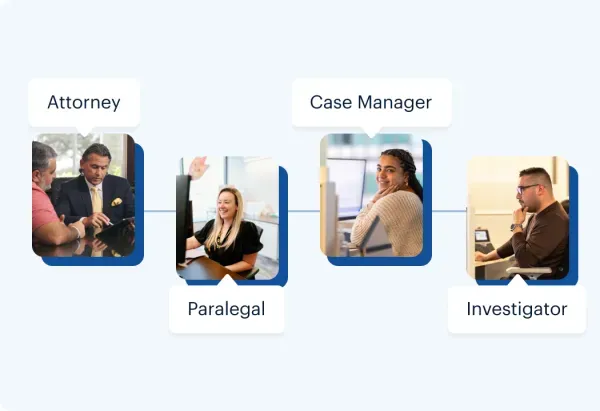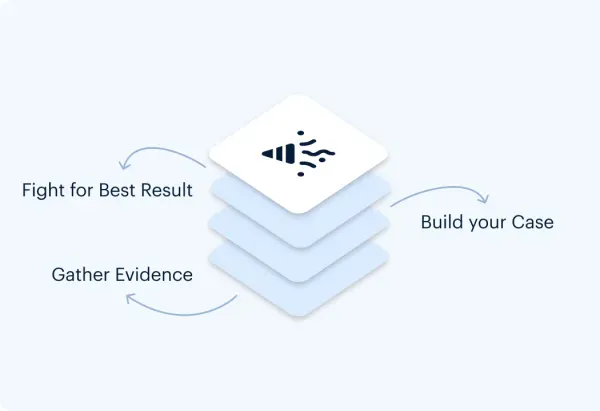Results may vary depending on your particular facts and legal circumstances. The attorney featured above is licensed in Florida. For a full list of attorneys in your state please visit our attorney page.
PENNSYLVANIA WORKERS' COMPENSATION PROCESS
Work injuries can turn life upside down. We fight for injured workers to access the medical care and wage support they’re entitled to.
Results may vary depending on your particular facts and legal circumstances. The attorney featured above is licensed in Florida. For a full list of attorneys in your state please visit our attorney page.
Workers' Compensation Process in Pennsylvania
You should know that if you're injured on the job in Pennsylvania, it is your right to make a workers' compensation claim to receive benefits. Pennsylvania has a Workers' Compensation Act which requires all businesses or employers who employ one or more individuals to take part in the state's workers' compensation program. All employees are covered under this program, whether full-time, part-time, or seasonal employees, with a few exceptions for workers that are covered under other programs such as railroad, government, longshoremen, and casual workers. You are not covered if you work for yourself as a sole proprietor.
When you get hurt on the job, it can be a very stressful experience. You're worried about how to pay for medical treatment and have the added stress of not being able to earn a living. Now you're wondering, "What is the workers' compensation process in Pennsylvania" and how do you navigate through the maze of paperwork and filing deadlines. That's where Morgan & Morgan workers' compensation lawyers can help. Here are just a few benefits we can help you acquire:
Pennsylvania workers' compensation benefits
Lost wages: You may be eligible to collect two-thirds of your average weekly pay; however, there are limits for high-wage earners.
Medical expenses: All medical costs connected to your on the job injury should be covered
Specific loss benefits: If you've lost part or all of the function of a body part, you may be eligible to receive benefits that are based upon the body part that was lost or damaged and the amount of time you'll miss out on work because of the injury.
Death benefits: Pennsylvania workers' comp pays the family a $3000 funeral expense benefit and provides the surviving spouse and underage children a percentage of the deceased wages. The spouse may receive benefits until remarried.
About workers' compensation benefits in Pennsylvania
Pennsylvania employers are responsible for all workers' compensation costs. Workers' compensation is a no-fault insurance plan meaning it doesn't matter whether your injury was your fault or the employer's, with a few exceptions. The concept of workers' compensation programs came out of necessity as workers injured on the job had to prove the employer was negligent, thus responsible. This was very hard to prove as many employers would argue the workers understood the dangers of the job. To fix this disparity, legislative bodies developed a structure adopted at the state level as a social program that benefited employees and employers. Workers no longer had the burden of proof, and employers were protected from being sued and from paying exorbitant insurance premiums.
Workers are now covered when injured on the job within the scope of their duties such as:
- Being injured on the job during work hours
- Being injured while traveling for work such as client meetings, conferences, and work-related errands
- Being injured at home in work-from-home positions
- Being injured while performing off-site duties such as repair work at private homes or installing equipment at a client's place of business
100,000+ Five Star Reviews
The reasons why clients trust Morgan & Morgan.
Results may vary depending on your particular facts and legal circumstances. Based on select nationwide reviews.
What about independent contractors?
The rules concerning independent contractors are complex. Simply because an employer considers someone an independent contractor doesn't mean they qualify as such under the law, according to the Pennsylvania Department of Labor & Industry. For example, under the following criteria, an independent contractor may be considered an employee:
- If they work at a location that was directed by the employer
- If they are subject to supervision and instruction concerning the details of the work
- If they are subject to termination by the employer
- The individual performs ongoing work for the employer
- They use tools, materials, and equipment provided by the employer
- Has taxes such as federal income and FICA deducted by the employer
- Performs responsibilities assigned by the employer
- Works set hours dictated by employer
- If they receive a regular salary from the employer usually based on hourly, weekly, or monthly rate
When it comes to defining whether you're an independent contractor and thus ineligible for workers' compensation benefits, you may need the help of one of our workers' comp lawyers to defend your rights to payment for your on-the-job injury.
When are you not covered by workers' comp benefits in Pennsylvania?
- Your injury did not happen while working
- You were under the influence of drugs or alcohol when the injury occurred
- You were engaged in horseplay or fighting when the injury occurred
- You were injured at another location during break time, such as lunch
When injured on the job in Pennsylvania, it's natural to have questions about the process of filing a claim. It's important to understand the filing process, deadlines, and timeframes. You may be lucky and have an employer that recognizes your injury and makes the process simple, and even helps you. However, that may not be the case, and you're getting pushback, threats, or even get fired. In that case, you need to contact us right away. We can help you understand your rights and explain the process better for you.
When is the right time to file a claim for being injured at work?
Timing is everything in a workers' compensation claim. As soon as you are injured or suspect that you have developed a work-related illness, it's imperative to bring this to the attention of a supervisor or Human Resources Department if your employer has one. You're limited to 120 days from the time your injury or illness developed to report it. After that, you're out of luck, so never wait until the last moment, hoping you'll feel better. The longer you wait, the more difficult it will be to tie your injury to your employer.
When you delay reporting workplace injuries, it makes it easier for your employer and the insurance company to argue that the injury occurred elsewhere or not under the circumstances you describe. For example, let's say you were just hired as a new chef for a restaurant, but early on in your employment, you cut yourself badly with a knife. You don't report it because you want to make a good impression. Still, later on, the cut gets infected, and now you have sepsis requiring a hospital stay for treatment. Because you waited to report it, your employer could argue the injury happened anywhere, and they'd likely be successful unless there were witnesses or CCTV footage documenting the injury.
What is the workers' compensation process in Pennsylvania as regards paperwork?
Once you've reported your injury and you miss out on time at work, your employer is required to contact the Bureau of Workers' Compensation to notify them. This is called the First Report of Injury (FROI) and needs to be completed within three days of your first missed day at work. Should death occur, the requirement is within 48-hours. Notifying the Bureau of Workers' Compensation of your FROI doesn't activate anything. It's simply notifying the bureau of the timeline should you choose to file a claim.
Furthermore, your employer is required to notify their insurance company which will have 21 days from the time of notification, to either approve or deny your workers' comp claim. If the insurance company approves the claim, you will receive a Notice of Compensation Payable and start to receive benefits. If the insurance company requires more time to rule if your claim is valid, you will receive a Notice of Temporary Compensation Payable which means you get some benefits while they make a final decision.
If the insurance company denies benefits, you will receive a Notice of Workers' Compensation Denial. You have three years from the date of your injury or discovery of illness to file a claim petition or reopen the claim to be assigned a Workers' Compensation Judge. Suppose you're in the situation of being denied your benefits and feel the decision is unfair. In that case, it's time to lawyer up.
When you notify your employer of your injury or illness within 21 days of the occurrence of injury or the discovery of illness, you will receive benefits from the date of the development. If you wait to report after the 21 days, but within the 120-day window, your benefits will kick in from the date it was reported.
How do I file a successful workers' comp claim in PA?
To be successful in your workers' comp claim, it's important to see a doctor immediately after injury, even if you think it's minor. Tell the doctor you were injured on the job and ask them to include that in your medical file. Failure to see a doctor quickly opens up an avenue for the insurance company to decide your injury must not have been very serious since you delayed seeking treatment. When you see a physician or therapist, be sure to document everything you can, including the time and date. Be sure to get copies of all documentation. In Pennsylvania, you are required to see a doctor chosen from a panel of doctors of your employer choosing within the first 90 days or pay your own medical bills. After the 90-day period, you can see a doctor of your choice.
What are common excuses insurance companies use to deny workers' comp claims?
One of the trickiest workplace injuries comes from repetitive movements or illnesses that develop over time. Carpal tunnel syndrome is very common if your work requires you to be at the keyboard eight hours a day. However, your employer could argue that since you're also an avid gamer or write novellas as a hobby, that is the real reason for your injury. Denial of benefits can be fought with the right type of workers' comp lawyer.
Another example would be COPD. Say you work in a chemical factory and are exposed to fumes all day. Then you start to notice long-term symptoms like shortness of breath and cough. However, you're also known to ride dirt bikes, and as the name implies, you kick up a lot of dust on your weekends. An insurance company could use this as a reason to deny your benefits. However, getting expert legal counsel may help you overcome these objections.
How can Morgan & Morgan help with my worker's comp claim?
Morgan & Morgan can help minimize your frustration and save you loads of time while you recover in peace. We've been advocates for workers since the beginning of our firm over 35 years ago. In fact, an on-the-job injury was one of the reasons our founder went into law in the first place. We understand the damaging impact a work injury can have on individuals and their families both in the short and long term. We're all about fighting for your rights, so you don't have to worry about medical bills and lost wages due to your injury. If you've been denied workers' comp or are having a difficult time with the process, contact us for a free case evaluation today.
Our Results
How It Works
Unsure what to do next? With 35 years of experience, our personal
injury lawyers will guide you every step of the way.

Contact Us 24/7 - It’s Free
Start your claim

Meet your dedicated attorney
Meet the attorneys

We fight for more
Learn more about the case process
Results may vary depending on your particular facts and legal circumstances. The attorneys shown in these photos may not be licensed in your state. To find an attorney licensed in your area, please visit our attorney page.
Local Care
Backed by America’s Largest Injury Law Firm.
$30 Billion
Recovered for clients
nationwide700,000+
Clients and families
served1,000+
Attorneys across
the country1
Click may change your life
The attorney featured above is licensed in Florida. For a full list of attorneys in your state please visit our attorney page.
Results may vary depending on your particular facts and legal circumstances.
In the Community
Discover the local Morgan & Morgan experience with news, events, and partnerships.
Learn More
Injured and not sure what to do next?
We'll guide you through everything you need to know.

























